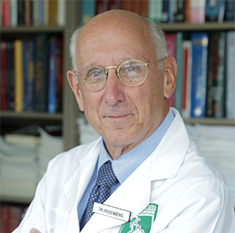
Research Topics
Dr. Rosenberg has pioneered the development of immunotherapy that has resulted in the first effective immunotherapies for selected patients with advanced cancer. His studies of cell transfer immunotherapy have resulted in durable complete remissions in patients with metastatic melanoma. He has also pioneered the development of gene therapy and was the first to successfully insert foreign genes into humans. His recent studies of the adoptive transfer of genetically modified lymphocytes has resulted in the regression of metastatic cancer in patients with melanoma, sarcomas and lymphomas.
Biography
Dr. Rosenberg is Chief of the Surgery Branch at the National Cancer Institute in Bethesda, Maryland and a Professor of Surgery at the Uniformed Services University of Health Sciences and at the George Washington University School of Medicine and Health Sciences in Washington, D.C. He is a Professor in the Department of Laboratory Medicine at the Karolinska Institutet in Stockholm, Sweden.
Dr. Rosenberg received his B.A. and M.D. degree at The Johns Hopkins University in Baltimore, Maryland and a Ph.D. in Biophysics at Harvard University. After completing his residency training in surgery in 1974 at the Peter Bent Brigham Hospital in Boston, Massachusetts, Dr. Rosenberg became the Chief of the Surgery Branch at the National Cancer Institute, a position he has held to the present time.
Dr. Rosenberg pioneered the first effective immunotherapies for patients with advanced cancer. His basic and clinical studies of interleukin-2 directly resulted in the approval of this immunotherapy by the US Food and Drug Administration for the treatment of patients with metastatic melanoma and renal cancer, many of whom remain disease-free over 25 years after treatment. His studies of cell transfer immunotherapy using tumor infiltrating lymphocytes (TIL) that resulted in durable complete remissions in patients with metastatic melanoma were the first to directly demonstrate the effective role of T lymphocyte in human cancer immunotherapy and the approach has now been applied to the treatment of patients with metastatic solid cancers. He pioneered the development of gene therapy and was the first to successfully insert foreign genes into humans. He was the first to demonstrate the clinical effectiveness of genetically engineered Chimeric Antigen Receptor (CAR) T-cells to mediate the regression of B-cell malignancies in humans, a treatment now approved by the FDA for widespread use. In recent work Dr. Rosenberg established new approaches for the application of immunotherapy to patients with a variety of common solid epithelial cancers by targeting the unique mutations present in the patient’s cancer.
For these contributions Dr. Rosenberg has received the highest awards from virtually every major organization involved in the study of cancer. Recently he received the Keio Medical Science Prize (2012), the American Cancer Society Medal of Honor (2015), the Novartis Prize for Clinical Immunology (2016),the Albany Medical Center Prize (2018), the American Association of Immunology Steinman Award for Human Immunology Research (2019), the Szent-Gyorgi Prize for Progress in Cancer Research (2019), the Edogawa NICHE Prize (2019), the Anthony Cerami Award in Translational Medicine (2019), AACR-CRI Lloyd J. Old Award in Cancer Immunology (2020), Samuel D. Gross Prize from Philadelphia Academy of Surgery (2020), the establishment of the Steven A. Rosenberg Scholars Prize in Cancer Immunotherapy from the Society for Immunotherapy of Cancer (2020), the Dan David Prize in Molecular Medicine from Tel Aviv University, Israel (2021), the Pezcoller Foundation-AACR Award for Extraordinary Achievement in Cancer Research (2022), the 2022 ICON in Surgery Award from the American College of Surgeons, and the Charles M. Balch, MD Distinguished Service Award from the Society of Surgical Oncology (2023), National Medal of Technology and Innovation (2023).
Dr. Rosenberg is a member of the National Academy of Medicine. He has published over 1200 papers in the peer-reviewed literature. His h-index of 208 continues to make him one of the highest cited clinician/scientists in the world.
Selected Publications
- Tran E, Robbins PF, Rosenberg SA. 'Final common pathway' of human cancer immunotherapy: targeting random somatic mutations. Nat Immunol. 2017;18(3):255-262.
- Tran E, Robbins PF, Lu YC, Prickett TD, Gartner JJ, Jia L, Pasetto A, Zheng Z, Ray S, Groh EM, Kriley IR, Rosenberg SA. T-Cell Transfer Therapy Targeting Mutant KRAS in Cancer. N Engl J Med. 2016;375(23):2255-2262.
- Tran E, Turcotte S, Gros A, Robbins PF, Lu YC, Dudley ME, Wunderlich JR, Somerville RP, Hogan K, Hinrichs CS, Parkhurst MR, Yang JC, Rosenberg SA. Cancer immunotherapy based on mutation-specific CD4+ T cells in a patient with epithelial cancer. Science. 2014;344(6184):641-5.
- Robbins PF, Lu YC, El-Gamil M, Li YF, Gross C, Gartner J, Lin JC, Teer JK, Cliften P, Tycksen E, Samuels Y, Rosenberg SA. Mining exomic sequencing data to identify mutated antigens recognized by adoptively transferred tumor-reactive T cells. Nat Med. 2013;19(6):747-52.
- Rosenberg SA, Yang JC, Sherry RM, Kammula US, Hughes MS, Phan GQ, Citrin DE, Restifo NP, Robbins PF, Wunderlich JR, Morton KE, Laurencot CM, Steinberg SM, White DE, Dudley ME. Durable complete responses in heavily pretreated patients with metastatic melanoma using T-cell transfer immunotherapy. Clin Cancer Res. 2011;17(13):4550-7.
Related Scientific Focus Areas
This page was last updated on Friday, May 16, 2025



